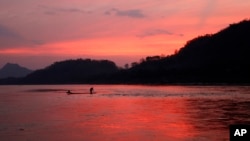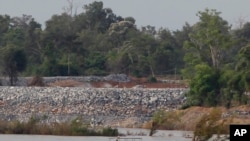Members of Mekong River Commission and civil society groups will be heading to Luang Prabang in Laos to attend the regional stakeholder meeting on Wednesday to discuss Laos’ proposal to build a third dam on the Mekong mainstream, the Pak Beng.
The 912-MW dam project has been heavily criticized over the expected impact on the livelihoods of millions of people who depend on the Mekong.
Courtney Weatherby, research analyst with the Southeast Asia program at the Stimson Center, based in Washington D.C., said expectations for a change to the plans were low given previous exchanges with Laos over the Don Sahong and Xayaburi dams.
“I think that the consultation forum will be an important indicator for what the long-term prospects for the dam are. We have seen very clearly from the consultation processes for Xayaburi and Don Sahong that it is difficult to have a two-way conversation when the developers and the government of Laos have essentially decided before the consultation that they are moving forward with the project.”
Initiated by the Mekong River Commission, the Procedures for Notification, Prior Consultation and Agreement process, or PNPCA, aims to allow the four member countries including Laos, Thailand, Vietnam and Cambodia, to raise their concerns prior to building dams on the lower Mekong.
Tek Vannara, executive director at the NGO Forum in Cambodia, told VOA Khmer that the PNPCA agreement is a good initiative if concerns are taken into consideration.
“The PNPCA procedures agreement is good if the Laos government and the Mekong River Commission take the result from the consultation meeting into consideration, include it in the plan, and enforce the decision,” he said.
However, he continued that the PNPCA procedures agreement was just a formality based on political reasons, rather than technical ones.
Under The Mekong River Commission's 1995 agreement, every member is required to conduct a study and have prior consultation before any member can build a dam in order to guarantee sustainable development.
Unfortunately, Laos has not adhered to the agreement, building several dams without proper consultation, according to Meach Mean, coordinator at the 3S Rivers Protection Network.
“The main impact is on political policy. Laos is trying not to abide by the 1995 Mekong agreement,” he said.
Vannara said the NGO Forum would suggest Laos postpone building the three dams until impact studies could be carried out.
Similarly, Weatherby recommended the Mekong River Commission use its influence to make sure people’s voices are heard.
“I would really recommend that the Mekong River Commission uses its very important role as a convener to make sure that those conversations happen, so that all of the concerns are really brought to people who are making a decision about the project.”
The PNPCA procedures agreement process will take six months to complete. Prior consultation on the Pak Beng project began last December. After the regional stakeholder meeting this month there will be a field visit to Pak Beng in April.





